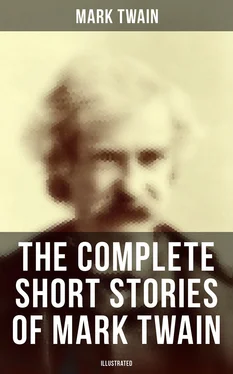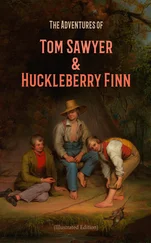You cannot bet anything on dreams.
Short and Singular Rations
Table of Contents
As many will remember, the clipper-ship Hornet, of New York, was burned at sea on her passage to San Francisco. The disaster occurred in lat, 2° 20' north, long. 112° 6' west. After being forty-three days adrift on the broad Pacific, in open boats, the crew and passengers succeeded in making Hawaii. A tribute to the courage and brave endurance of these men has been paid in a letter detailing their sufferings (the particulars being gathered from their own lips), from which the following excerpt is made:—
On Monday, the thirty-eighth day after the disaster, "we had nothing left," said the third mate, "but a pound and a half of ham—the bone was a good deal the heaviest part of it—and one soup-and-bully tin." These things were divided among the fifteen men, and they ate it—two ounces of food to each man. I do not count the ham-bone, as that was saved for next day. For some time, now, the poor wretches had been cutting their old boots into small pieces and eating them. They would also pound wet rags to a sort of pulp and eat them.
On the thirty-ninth day the ham-bone was divided up into rations, and scraped with knives and eaten. I said, "You say the two sick men remained sick all through, and after a while two or three had to be relieved from standing watch; how did you get along without medicines?"
The reply was, "Oh! we couldn't have kept them if we'd had them; if we'd had boxes of pills, or anything like that, we'd have eaten them. It was just as well—we couldn't have kept them, and we couldn't have given them to the sick men alone—we'd have shared them around all alike, I guess." It was said rather in jest, but it was a pretty true jest, no doubt.
After apportioning the ham-bone, the captain cut the canvas cover that had been around the ham into fifteen equal pieces, and each man took his portion. This was the last division of food the captain made. The men broke up the small oaken butter tub, and divided the staves among themselves, and gnawed them up. The shell of a little green turtle was scraped with knives, and eaten to the last shaving. The third mate chewed pieces of boots, and spit them out, but ate nothing except the soft straps of two pairs of boots—ate three on the thirty-ninth day, and saved one for the fortieth.
The men seemed to have thought in their own minds of the shipwrecked mariner's last dreadful resort—cannibalism; but they do not appear to have conversed about it. They only thought of the casting lots and killing one of their number as a possibility ; but even when they were eating rags, and bone, and boots, and shell, and hard oak wood, they seem to have still had a notion that it was remote. They felt that some one of the company must die soon—which one they well knew; and during the last three or four days of their terrible voyage they were patiently but hungrily waiting for him. I wonder if the subject of these anticipations knew what they were thinking of? He must have known it—he must have felt it. They had even calculated how long he would last. They said to themselves, but not to each other—I think they said, "He will die Saturday—and then!"
There was one exception to the spirit of delicacy I have mentioned—a Frenchman—who kept an eye of strong personal interest upon the sinking man, and noted his failing strength with untiring care and some degree of cheerfulness. He frequently said to Thomas, "I think he will go off pretty soon now, sir; and then we'll eat him!" This is very sad.
Thomas, and also several of the men, state that the sick "Portyghee," during the five days that they were entirely out of provisions, actually ate two silk handkerchiefs and a couple of cotton shirts, besides his share of the boots, and bones, and lumber.
Captain Mitchell was fifty-six years old on the twelfth of June—the fortieth day after the burning of the ship and the third day before the boat's crew reached land. He said it looked somewhat as if it might be the last one he was going to enjoy. He had no birthday feast except some bits of ham-canvas—no luxury but this, and no substantiate save the leather and oaken bucket-staves.
Speaking of the latter diet, one of the men told me he was obliged to eat a pair of boots, which were so old and rotten that they were full of holes; and then he smiled gently and said he didn't know, though, but what the holes tasted about as good as the balance of the boot. This man was very feeble, and after saying this he went to bed.
THE END.
Mark Twain's (Burlesque) Autobiography and First Romance
Table of Contents
Table of Contents
Burlesque Autobiography
Awful, Terrible Medieval Romance
Chapter I. The Secret Revealed
Chapter II. Festivity and Tears
Chapter III. The Plot Thickens
Chapter IV. The Awful Revelation
Chapter V. The Frightful Catastrophe
Table of Contents
Two or three persons having at different times intimated that if I would write an autobiography they would read it, when they got leisure, I yield at last to this frenzied public demand, and herewith tender my history:
Ours is a noble old house, and stretches a long way back into antiquity. The earliest ancestor the Twains have any record of was a friend of the family by the name of Higgins. This was in the eleventh century, when our people were living in Aberdeen, county of Cork, England. Why it is that our long line has ever since borne the maternal name (except when one of them now and then took a playful refuge in an alias to avert foolishness), instead of Higgins, is a mystery which none of us has ever felt much desire to stir. It is a kind of vague, pretty romance, and we leave it alone. All the old families do that way.
Arthour Twain was a man of considerable note—a solicitor on the highway in William Rufus' time. At about the age of thirty he went to one of those fine old English places of resort called Newgate, to see about something, and never returned again. While there he died suddenly.
Augustus Twain, seems to have made something of a stir about the year 1160. He was as full of fun as he could be, and used to take his old sabre and sharpen it up, and get in a convenient place on a dark night, and stick it through people as they went by, to see them jump. He was a born humorist. But he got to going too far with it; and the first time he was found stripping one of these parties, the authorities removed one end of him, and put it up on a nice high place on Temple Bar, where it could contemplate the people and have a good time. He never liked any situation so much or stuck to it so long.
Then for the next two hundred years the family tree shows a succession of soldiers—noble, high-spirited fellows, who always went into battle singing; right behind the army, and always went out a-whooping, right ahead of it.
This is a scathing rebuke to old dead Froissart's poor witticism that our family tree never had but one limb to it, and that that one stuck out at right angles, and bore fruit winter, and summer.
||=======|====
|| |
|| |
|| O
|| / || \
|| ||
|| ||
||
||
||
OUR FAMILY TREE
Early in the fifteenth century we have Beau Twain, called "the Scholar." He wrote a beautiful, beautiful hand. And he could imitate anybody's hand so closely that it was enough to make a person laugh his head off to see it. He had infinite sport with his talent. But by and by he took a contract to break stone for a road, and the roughness of the work spoiled his hand. Still, he enjoyed life all the time he was in the stone business, which, with inconsiderable intervals, was some forty-two years. In fact, he died in harness. During all those long years he gave such satisfaction that he never was through with one contract a week till government gave him another. He was a perfect pet. And he was always a favorite with his fellow-artists, and was a conspicuous member of their benevolent secret society, called the Chain Gang. He always wore his hair short, had a preference for striped clothes, and died lamented by the government. He was a sore loss to his country. For he was so regular.
Читать дальше












